Houthis Warn Direct US Aggression In Yemen Will Not Be Tolerated
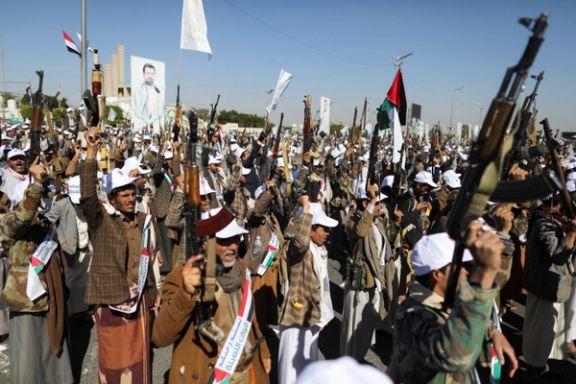
Yemen's Houthi Supreme Political Council has warned the US and Israel that they will face an "unpredicted" response if a direct attack is launched against them.

Yemen's Houthi Supreme Political Council has warned the US and Israel that they will face an "unpredicted" response if a direct attack is launched against them.
“If we are directly attacked by the US and Israel, they will face a response that they do not expect and predict,” Yasser al-Huri Secretary of Yemen's Supreme Political Council told Iran’s Official News Agency IRNA on Sunday.
"Battlefields will be expanded and methods of confrontation will be more varied", al-Huri added.
The Houthis in Yemen, who receive military assistance and weapons from Iran, began attacking commercial shipping in mid-November in response to the call of the Iranian Supreme Leader Ali Khamenei to block Israeli trade, but as the world's main oil route, it has garnered a global response.
The attacks have caused some shipping companies, including four of the largest five, to cease operations on this route for security reasons.
The US announced a coalition to safeguard commercial traffic in the Red Sea following the disruption in global maritime trade. As of Thursday, more than 20 countries have agreed to participate in the joint naval patrol near Yemen.
While the US has avoided pointing direct blame at Iran for regional tensions, instead focusing on its proxies, the Pentagon announced that the kamikaze drone that struck an oil tanker in the Indian Ocean early Saturday morning was launched directly from Iran.
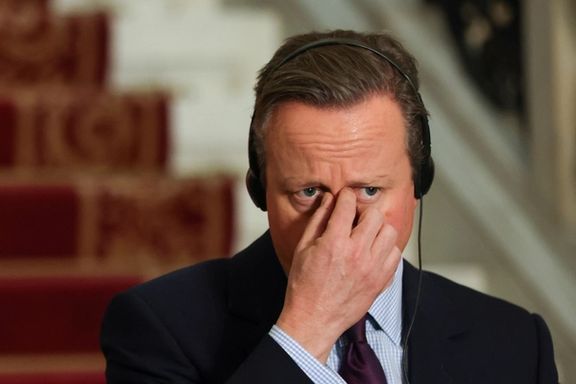
The UK foreign secretary summoned Iran's chargé d’affaires Friday, warning that Iran's "malign" activities will not be tolerated on UK soil or in the Middle East.
David Cameron's action followed revelations that the Iranian regime planned to assassinate two Iran International news presenters, Sima Sabet and Fardad Farahzad, in London last year.
The recently appointed foreign secretary said he wanted "to make it clear that these threats will not be tolerated", according to the Telegraph.
Over 15 Iranian threats and plots to kill British or UK-based individuals have been reported since the beginning of last year, according to government officials.
On Friday, England's Central Criminal Court sentenced a man arrested for gathering information about Iran International's London headquarters to three and a half years in prison.
Iran must be sent “an incredibly clear message that this escalation will not be tolerated,” Cameron said, citing “the threat of Iran” as one of five significant “crises” causing “extraordinarily difficult times for the world”, in addition to the Russia-Ukraine conflict, terrorism, and climate change.
The UK's tough stance follows a similar move by the US on Friday. In a clear statement, the White House stated that Iran is deeply involved in planning drone and missile attacks against commercial vessels in the Red Sea by providing intelligence to the Houthis which have blockaded the major trade route in allegiance with fellow Iran-backed militia, Hamas, in its war against Israel.
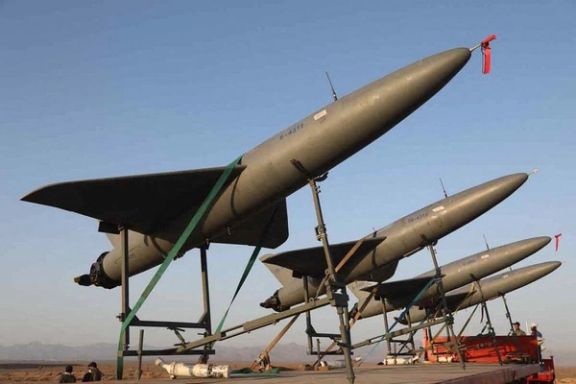
In a major development, the Pentagon said that the kamikaze drone which struck an oil tanker in the Indian Ocean early Saturday was launched directly from Iran.
The incident comes against a backdrop of Houthi attacks on commercial vessels in the Red Sea, and may suggest an escalation of regional tensions that began with the Hamas rampage of Israel on October 7 and the ensuing Israeli onslaught on Gaza.
So far, the maritime theater of conflict was confined to the Red Sea, with Iran-backed Houthis in Yemen the sole instigator.
One day before the Saturday attack, the US government accused Iran of being “deeply involved” in Houthi operations in the Red Sea. This is the first time in the recent conflict, however, that the Biden administration blames Iran for directly striking a vessel –and the first time such a strike takes place so far away from the Red Sea.
The tanker Chem Pluto was hit 200 nautical miles from the Indian coast, carrying oil from Saudi Arabia to India.
MV Cham Pluto is a Liberian-flagged, Japanese-owned vessel managed by the Netherlands’ Ace-Quantum Chemical Tankers, which is reportedly connected to the Israeli shipping tycoon Idan Ofer. And that may explain why it was selected as a target.
Some Iranian one-way “kamikaze” drones boast a range of “over 1,000 kilometers”. The one most publicized, perhaps, is Shahed 136 that has been used by Russia against Ukraine.
Iran has not yet reacted to the claim that it was behind the attack on Chem Pluto. But the regime officials have repeatedly denied involvement in the Houthi attacks.
“The resistance has its own tools of power and acts according to its decisions and capabilities,” Iran’s deputy foreign minister said Saturday in reaction to the White House claim that the regime in Tehran was "deeply involved" in planning the Houthi operations. Iran’s foreign minister repeated the counterclaim.
“We told the Americans that if we had a role, we would have declared it,” he said Saturday. “We do not have any proxy groups. These groups are real and act in line with their country's national security.”
The “kamikaze” attack on an oil tanker headed for India 200 miles off the Indian coast is a serious development, whoever the perpetrator. It could cause shipping insurance rates to go higher and ‘unsafe’ waters expand to the Indian Ocean and elsewhere, exacerbating the disruption caused by Houthi attacks in the Red Sea.
In an interview with the Telegraph on Saturday, the UK foreign secretary warned about dangers to “maritime freedom” caused by recent attacks. He said Iran must be sent “an incredibly clear message that this escalation will not be tolerated.”
Only hours earlier, the IRGC’s deputy commander had threatened that the Mediterranean Sea could be closed if the US and its allies continued to commit "crimes" in Gaza –without any suggestions as to how such a threat could be realized.
In the US, many critics of President Joe Biden say it is his reluctance to confront Iran that has emboldened the regime and its proxies in the region.
“Iran proxies, the Houthi rebels, are small in number but have all but stalled commerce in the Red Sea while we do nothing to stop them,” said former US national security advisor John Bolton on Saturday. “The mullahs in Tehran will not cooperate with our government no matter how hard Biden and Obama-era officials blindly push a return to the flawed 2015 nuclear deal to appease them.”
Congressman Mike Collins seconded the critique.
“Iran can strike civilian ships and the Biden administration will do nothing in return. Deterrence is dead,” he posted on X Saturday evening.
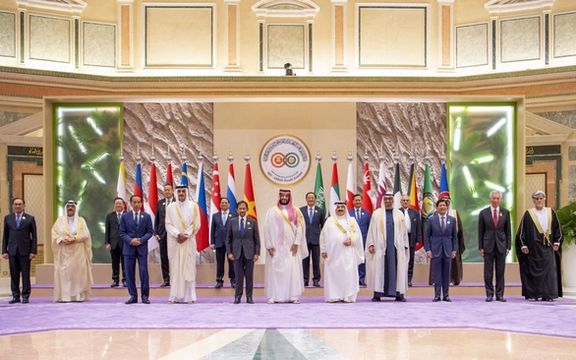
As Iran grapples with a severe lack of foreign investment, its Arab neighbors are increasingly channeling funds into Iran's northern regions, boosting trade turnover.
On December 17, the United Arab Emirates and the Republic of Azerbaijan jointly launched a substantial investment fund worth one billion dollars. This collaborative venture sees the Azerbaijan Investment Holding and the Abu Dhabi Investment Company each holding a 50% stake in the fund. The primary focus of their investments will revolve around clean energy, agriculture, pharmaceuticals, and technology, encompassing Azerbaijan, the UAE, and Central Asia.
In recent years, Gulf Cooperation Council (GCC) members, particularly Saudi Arabia and the United Arab Emirates, have signed investment agreements totaling nearly $30 billion with the Republic of Azerbaijan and four Turkic-speaking Central Asian nations, including Turkmenistan, Uzbekistan, Kazakhstan, and Kyrgyzstan. These agreements have significantly bolstered trade relations between the Arab states and these countries, with a notable emphasis on non-oil products and substantial investments directed toward clean energy initiatives.
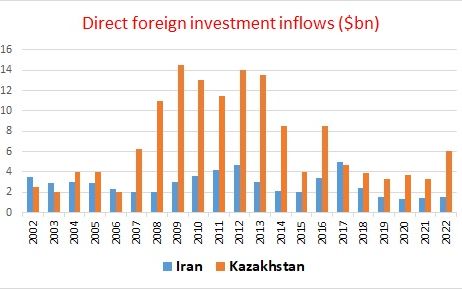
GCC And Azerbaijan
Emirates-based company "Masdar" unveiled a $262 million, 230-megawatt solar power plant in the Republic of Azerbaijan just two months ago. Simultaneously, Masdar signed contracts for the construction of three solar and wind power firms, boasting a combined capacity of one gigawatt, all within Azerbaijan.
Joining the renewable energy endeavors in Azerbaijan, French Total and British BP, along with Saudi's "Acwa Power," are currently investing $290 million to establish a 230-megawatt wind power plant. Furthermore, these companies inked two significant agreements this spring to generate 2,500 megawatts of wind and solar power, both on land and at sea, in collaboration with the Republic of Azerbaijan.
All these investments take place as Iran suffers from energy shortages and its renewable energy sector remains seriously under-developed.
Azerbaijan's contracts with Total and Acwa Power also include large electricity storage facilities, allowing the country to save and provide a significant amount of electricity for sale at much higher prices to foreign customers during peak consumption periods.
Azerbaijan has adopted a similar approach in its natural gas trade strategy. The nation has developed underground gas storage facilities and expanded its gas storage capacity to 3.5 billion cubic meters. During the summer, Azerbaijan injects surplus gas from Turkmenistan, received through Iran, into these storage facilities. Then, during the winter months, it re-extracts and exports this gas at considerably higher prices.
Abu Dhabi National Oil Company (ADNOC) has also entered the Azerbaijani energy sector by acquiring a 30% stake in the Absheron gas field, located in the Caspian Sea's Azerbaijani sector. While the first phase of this gas field, operated by Total, commenced operations this year, the second phase is scheduled to be operational by 2027. Upon full operation, the gas field will annually produce six billion cubic meters of gas destined for European markets.
Baku has ambitious plans to double its natural gas exports to Europe within the next three years. In a recent development, the country initiated gas sales to its seventh customer, Serbia. Currently, Georgia, Turkey, Greece, Italy, Romania, Bulgaria, and Serbia are all recipients of Azerbaijani gas, collectively importing 22 billion cubic meters of gas from Azerbaijan in the first 11 months of this year.
The revenue from Azerbaijani gas exports surpassed that of oil exports for the first time last year. The nation also has its sights set on substantial growth in electricity exports.
Azerbaijan aims to launch approximately 10,000 megawatts of renewable power plants by 2030, equivalent to ten times the electricity generation capacity of Iran's Bushehr nuclear power plant. A significant portion of this electricity will be exported to Europe. Notably, last year, Azerbaijan exported over three terawatt-hours of electricity, three times more than Iran's net electricity exports. A massive undersea cable installation project is underway, spanning 1,100 kilometers across the Black Sea from Georgia to the Baltic region. This initiative marks the beginning of Azerbaijan's electricity exports to Europe via Georgia.
Trade relations between the Republic of Azerbaijan and Saudi Arabia, as well as the United Arab Emirates, have experienced a fivefold and 2.5-fold increase, respectively, over the past three years. Importantly, a substantial portion of this trade involves non-oil commodities.
GCC And Central Asia
In the broader context of the Gulf Cooperation Council (GCC) and Central Asia, the United Arab Emirates and Saudi Arabia have collectively signed investment agreements exceeding $20 billion with four Turkic-speaking Central Asian countries, including Turkmenistan, Uzbekistan, Kazakhstan, and Kyrgyzstan. Additionally, Qatar and Oman have recently penned new investment memoranda with these nations.
The vast assets of GCC investment funds and national wealth, amounting to a staggering $4 trillion, have enabled these countries to embark on the establishment of innovative indigenous companies. This has facilitated the integration of modern Western technologies, leading to a significant influx of foreign projects.
For years, the UAE's Dragon Oil has held the exclusive development rights for Turkmenistan offshore oil and gas fields, exporting the produced oil to European markets through the Republic of Azerbaijan. Last year, the company signed a new billion-dollar contract with Turkmenistan and committed to investing $8 billion in new oil and gas fields over the next 15 years.
The UAE has invested seven billion dollars in Kazakhstan and Uzbekistan, part of which involves the development of a thousand megawatts of solar and wind power plants by the UAE's Masdar company. Qatar also signed a joint investment fund with an initial asset of $100 million, along with a commitment to invest in projects worth $1.2 billion in Kyrgyzstan.
The UAE also holds a 51-percent share in the Khorgos Customs in Kazakhstan in collaboration with China, and a 49% share in the Aktau Seaport in the Caspian Sea. Additionally, Saudi Arabia's Acwa Power has signed contracts worth $13.5 billion with Kazakhstan and Uzbekistan for the development of clean energy, including solar and wind, converting fossil fuels into clean hydrogen, and more.
During a meeting held in June that brought together leaders from the GCC and Central Asian countries, the Abu Dhabi National Energy Company announced a $3 billion investment agreement with Uzbekistan, focused on thermal power plants. In the same gathering, Qatar also committed to a $12 billion investment in Uzbekistan.
As these developments unfold, Oman and Kuwait are engaged in preliminary agreements for new investments in Central Asian nations. Currently, Oman holds a 20% stake in the Zhemchuzhina and Dunga oil fields located in Kazakhstan.
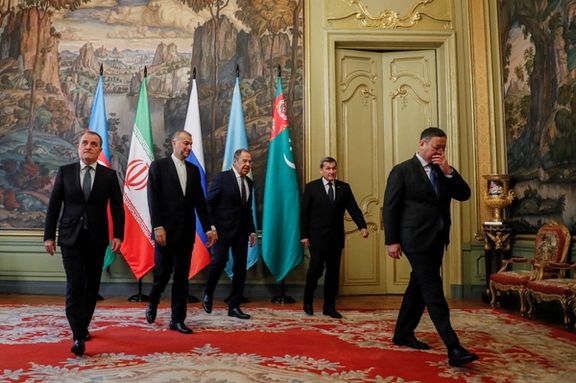
Iran, Northern Neighbors Relations
In contrast, Iran's financial relations with its northern neighbors revolve solely around trade, without the inclusion of joint investment projects, investment funds, and similar endeavors. This limitation is primarily attributed to political tensions between Iran and its neighboring states, as well as the impact of international sanctions.
In contrast, Iran's financial relations with its northern neighbors revolve solely around trade, without the inclusion of joint investment projects, investment funds, and similar endeavors. This limitation is primarily attributed to political tensions between Iran and its neighboring states, as well as the impact of international sanctions.
However, when it comes to Central Asia and the Caucasus, these eight countries collectively account for less than 4% of Iran's foreign trade. Despite shared religious, cultural, and linguistic ties, the intricate nature of Iran's economic relationship with these nations becomes evident.
In 2022, Iran's trade volume with Central Asian countries demonstrated significant growth, though it still comprised less than 2% of the nation's total foreign trade. Trade with Kyrgyzstan and Tajikistan, for instance, reached approximately $170 million. Furthermore, the trade volume between Kazakhstan and Iran witnessed a 20% increase compared to the previous year, totaling $528 million.
Iran currently occupies a limited geopolitical position in Central Asia, despite its advantageous geographic location and long-standing historical connections with the region. The rising investments from Saudi Arabia, the United Arab Emirates, and other Gulf Cooperation Council (GCC) countries further complicate the existing intricate dynamics. To remain relevant and assert its influence in Central Asia, Iran must recalibrate its regional policy, addressing diplomatic tensions, particularly with neighbors like Azerbaijan, and nurturing an environment conducive to enhanced economic collaboration. A proactive approach, involving the strengthening of economic ties, leveraging cultural affinities, and engaging in constructive dialogues, will be essential for Iran's continued significance amid the evolving dynamics of the region.
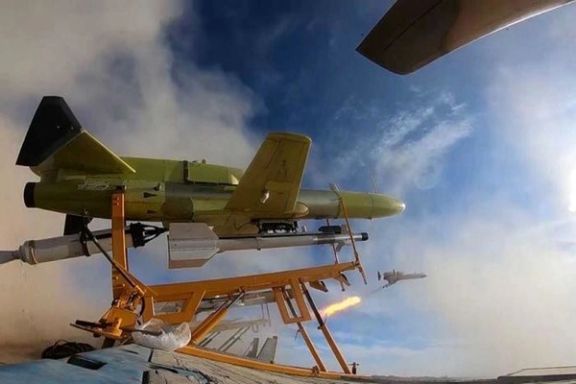
A vessel affiliated with Israel was hit by a drone in the Indian Ocean, 200 nautical miles Southwest of India, in a sign of attacks spreading against maritime traffic.
United Kingdom Maritime Trade Operation reported the incident on Saturday, as attacks by Iran-backed Houthi forces have escalated against commercial shipping in the Red Sea. The location is hundreds of miles from the Iranian and Yemeni territories, and it is not known from where the drone was launched.
Later, the vessel was identified as the Liberian-flagged tanker as MV Chem Pluto carrying crude oil from Saudi Arabia.
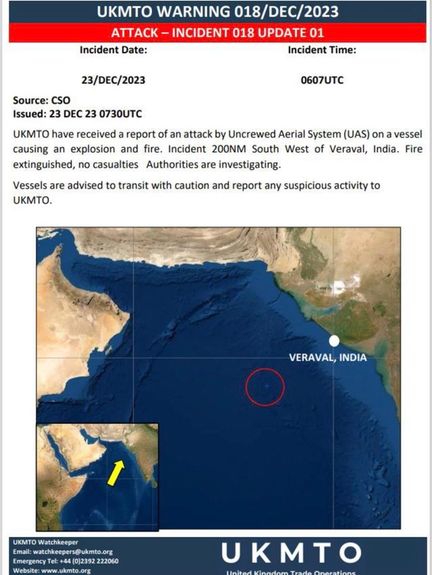
Some Iranian one-way kamikaze drones, such as Shahed 136 used by Russia against Ukraine, have a range of at least 1,000 kilometers.
Meanwhile, an Iranian Revolutionary Guards commander said the Mediterranean Sea could be closed if the United States and its allies continued to commit "crimes" in Gaza, Iranian media reported on Saturday, without explaining how that would happen. However, use of suicide drones launched from Syria, where Iran has a strong military presence, could endanger shipping in the Mediterranean Sea.
"They shall soon await the closure of the Mediterranean Sea, (the Strait of) Gibraltar and other waterways," Tasnim quoted Brigadier General Mohammad Reza Naqdi, coordinating commander of the Guards, as saying.
Iranian-backed Houthis began launching suicide drones and missiles at commercial vessels in the Red Sea in mid-November following Iranian Supreme Leader Ali Khamenei’s call to block Israeli commerce.
The US last week announced a naval coalition involving 20 countries aimed at helping safeguard vessels from attacks in the Red Sea. However, it is not clear if the naval coalition is a defensive arrangement or will conduct retaliatory attacks to deter the Houthis.
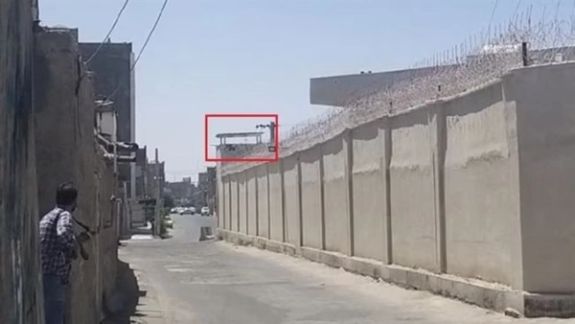
Iranian Baluch activists have reported a significant shooting incident near the Quds base of the Islamic Revolutionary Guard Corps (IRGC) in Sistan-Baluchistan province.
However, Governor Saeed Tajlili claimed that the shooting around the base was linked to a wedding celebration. According to initial reports, gunfire was reported last night in the vicinity of the base in Saravan. Tajlili added that military forces have detained the groom in connection with the incident.
As of now, no additional information is available concerning the circumstances surrounding the reported shooting.
The development comes on the heels of a recent attack on December 15 by the Sunni Jaish al-Adl militant group, targeting a police station in Rask, a small city in Sistan-Baluchistan Province. Iranian state media and Baluch groups reported a death toll of at least 12 police officers and several attackers killed during prolonged gunfire at the main police headquarters. Seven police officers sustained injuries, some critical.
Sistan-Baluchistan, an economically challenged province with a significant Sunni population of the Baluch ethnic group, grapples with ongoing tensions with Iran's Shiite clerical rulers. Regular clashes between security forces, Sunni militants, and drug smugglers characterize the region.
Discrepancies persist in casualty figures, with official reports stating 12 officers killed and at least seven injured, while Jaish al-Adl insists on a higher toll of 50.